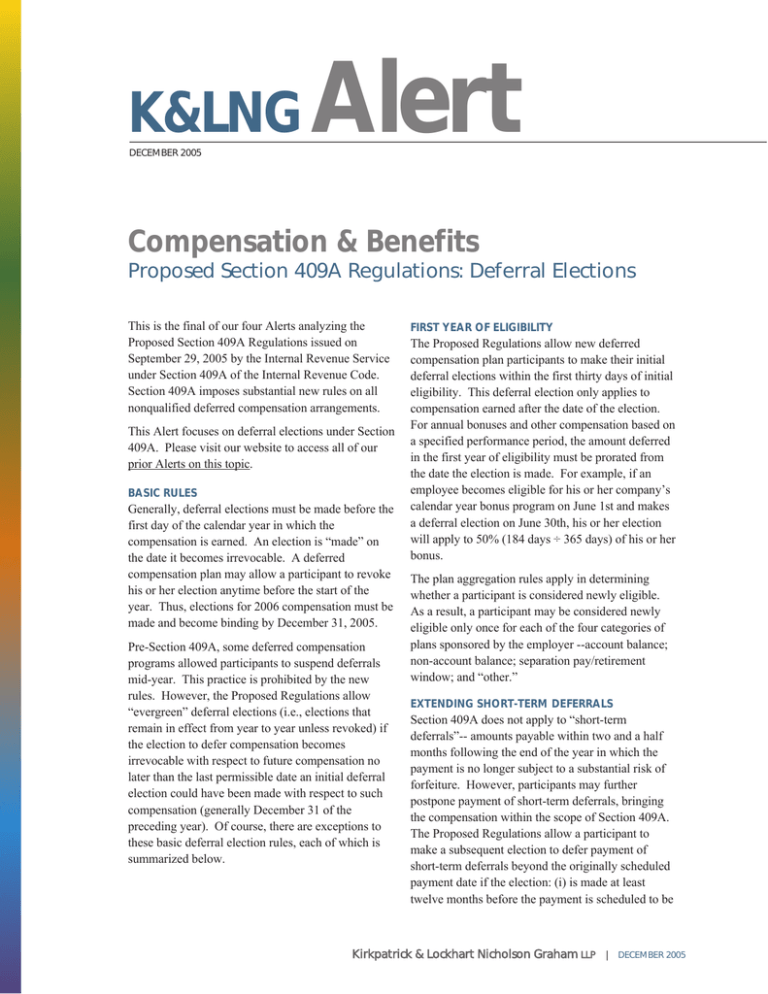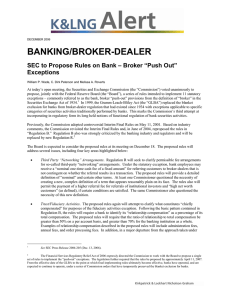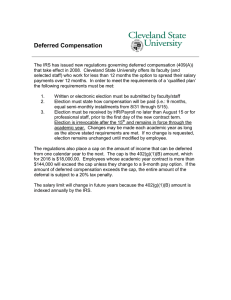
K&LNG
DECEMBER 2005
Alert
Compensation & Benefits
Proposed Section 409A Regulations: Deferral Elections
This is the final of our four Alerts analyzing the
Proposed Section 409A Regulations issued on
September 29, 2005 by the Internal Revenue Service
under Section 409A of the Internal Revenue Code.
Section 409A imposes substantial new rules on all
nonqualified deferred compensation arrangements.
This Alert focuses on deferral elections under Section
409A. Please visit our website to access all of our
prior Alerts on this topic.
BASIC RULES
Generally, deferral elections must be made before the
first day of the calendar year in which the
compensation is earned. An election is “made” on
the date it becomes irrevocable. A deferred
compensation plan may allow a participant to revoke
his or her election anytime before the start of the
year. Thus, elections for 2006 compensation must be
made and become binding by December 31, 2005.
Pre-Section 409A, some deferred compensation
programs allowed participants to suspend deferrals
mid-year. This practice is prohibited by the new
rules. However, the Proposed Regulations allow
“evergreen” deferral elections (i.e., elections that
remain in effect from year to year unless revoked) if
the election to defer compensation becomes
irrevocable with respect to future compensation no
later than the last permissible date an initial deferral
election could have been made with respect to such
compensation (generally December 31 of the
preceding year). Of course, there are exceptions to
these basic deferral election rules, each of which is
summarized below.
FIRST YEAR OF ELIGIBILITY
The Proposed Regulations allow new deferred
compensation plan participants to make their initial
deferral elections within the first thirty days of initial
eligibility. This deferral election only applies to
compensation earned after the date of the election.
For annual bonuses and other compensation based on
a specified performance period, the amount deferred
in the first year of eligibility must be prorated from
the date the election is made. For example, if an
employee becomes eligible for his or her company’s
calendar year bonus program on June 1st and makes
a deferral election on June 30th, his or her election
will apply to 50% (184 days ÷ 365 days) of his or her
bonus.
The plan aggregation rules apply in determining
whether a participant is considered newly eligible.
As a result, a participant may be considered newly
eligible only once for each of the four categories of
plans sponsored by the employer --account balance;
non-account balance; separation pay/retirement
window; and “other.”
EXTENDING SHORT-TERM DEFERRALS
Section 409A does not apply to “short-term
deferrals”-- amounts payable within two and a half
months following the end of the year in which the
payment is no longer subject to a substantial risk of
forfeiture. However, participants may further
postpone payment of short-term deferrals, bringing
the compensation within the scope of Section 409A.
The Proposed Regulations allow a participant to
make a subsequent election to defer payment of
short-term deferrals beyond the originally scheduled
payment date if the election: (i) is made at least
twelve months before the payment is scheduled to be
Kirkpatrick & Lockhart Nicholson Graham LLP |
DECEMBER 2005
made and (ii) the payment is deferred for at least five
years from the date the payment would otherwise
have been made. More detailed information on the
subsequent election rules is available in our
“Payment Elections and Payment Triggers” Alert.
FORFEITABLE RIGHTS
The Proposed Regulations relax the initial deferral
election rules for compensation that will be forfeited
unless the participant performs services for at least
the next twelve months. The participant may elect to
defer such forfeitable compensation within thirty
days of the award and at least twelve months before
the end of the service period.
FISCAL YEAR COMPENSATION
The Proposed Regulations modify the timing rules
for deferrals of compensation based on an employer’s
fiscal year. The initial deferral election must be
made by the end of the previous fiscal year. For
example, if an employer with an April 30 fiscal year
has a bonus program based on the company’s fiscal
year profit, an employee would have until April 30,
2006 to defer payment of the bonus for the year
ending April 30, 2007. This timing rule does not
apply to compensation that is not based on the
employer’s fiscal year.
SEPARATION PAY
The Proposed Regulations allow a participant to
defer certain severance pay at any time before the
participant has a binding right to the payment.
Thus, payment under a window program may be
deferred up to the date the participant irrevocably
elects to terminate employment, while severance
payable upon an involuntary discharge that is subject
to arm’s-length negotiations may be deferred up to
the time that the severance arrangement is final.
COMMISSIONS
An election to defer commissions must be made
before the year in which the customer pays the
employer. The Proposed Regulations define
commissions as compensation earned (i) for the
direct sale of a product or service to a customer, (ii)
consisting of a portion of the purchase price for the
product or service (e.g., 10% of the purchase price)
or an amount calculated solely by reference to
volume of sales (e.g., $100 per item sold) and (iii)
contingent upon the employer receiving payment
from the customer. For example, a salesperson may
2
defer commissions for sales made during calendar
year 2006 through December 31, 2006, provided that
the customer makes payment on or after 2007.
PERFORMANCE-BASED COMPENSATION
Notice 2005-1 permitted initial deferral elections of
performance-based compensation to be made as late
as six months before the end of the performance
period. The Proposed Regulations continue this
approach, provided that all of the following
requirements are met:
■
The performance period must be at least
twelve consecutive months.
■
One of the following must be true at the
time of the initial deferral election:
(i)
either the amount must not be readily
ascertainable, or
(ii)
the participant’s right to receive the
amount must not be substantially
certain.
■
The performance criteria must be written.
■
The performance criteria must be
established no later than ninety days after
the beginning of the performance period.
■
When established, the attainment of the
performance criteria must not be substantially
certain.
■
The compensation must not include any
amount that will be paid regardless of
performance.
■
The participant must perform services
continuously from the date the performance
criteria are established through the date of
the deferral election.
■
The performance criteria may be subjective if:
(i)
they relate to the performance of a
particular participant or the group or
business unit to which the participant
provides services; and
(ii)
a disinterested party determines whether
the criteria have been satisfied (e.g.,
determination is not made by the
participant, family member or a person
under the participant’s supervision).
Kirkpatrick & Lockhart Nicholson Graham
LLP
| DECEMBER 2005
■
In liberalization from Notice 2005-1,
performance-based compensation under the
Proposed Regulations may be based on
criteria tied solely to an increase in (i) the
value of the company or (ii) the value of the
company’s stock after the date of grant. For
example, stock options and stock
appreciation rights may qualify as
performance-based, but only if granted with
an exercise price at or above fair market
value.
■
Equity-based compensation, such as
restricted stock or restricted stock units, may be
performance-based if the entitlement to the
compensation is subject to a condition that would
cause the award to otherwise qualify, such as a
performance-based vesting condition.
David E. Morse
dmorse@klng.com
212.536.3998
Sonia A. Chung
schung@klng.com
412.355.6716
If you have questions about this topic or would like more information on Kirkpatrick & Lockhart Nicholson Graham’s
Compensation and Benefits practice, please contact one of our lawyers listed below:
SAN FRANCISCO
BOSTON
Peter J. Marathas, Jr.
Stephen E. Moore
617.951.9072 pmarathas@klng.com
617.951.9191 smoore@klng.com
Laurence A. Goldberg 415.249.1043 lgoldberg@klng.com
Marc R. Baluda
415.249.1036 mbaluda@klng.com
Lynn H. DuBois
415.249.1037 ldubois@klng.com
310.552.5071 wwade@klng.com
WASHINGTON
LOS ANGELES
William P. Wade
NEW YORK
David E. Morse
212.536.3998 dmorse@klng.com
PITTSBURGH
William T. Cullen
Michael A. Hart
J. Richard Lauver
Charles R. Smith
Richard E. Wood
Sonia A. Chung
Douglas J. Ellis
412.355.8600
412.355.6211
412.355.6454
412.355.6536
412.355.8676
412.355.6716
412.355.8375
Catherine S. Bardsley
David E. Pickle
William A. Schmidt
Lori G. Galletto
Brendan S. McParland
202.778.9289
202.778.9887
202.778.9373
202.778.9024
202.778.9210
cbardsley@klng.com
dpickle@klng.com
william.schmidt@klng.com
lgalletto@klng.com
bmcparland@klng.com
wcullen@klng.com
mhart@klng.com
rlauver@klng.com
csmith@klng.com
rwood@klng.com
schung@klng.com
dellis@klng.com
www.klng.com
BOSTON • DALLAS • HARRISBURG • LONDON • LOS ANGELES • MIAMI • NEWARK • NEW YORK • PALO ALTO • PITTSBURGH • SAN FRANCISCO • WASHINGTON
Kirkpatrick & Lockhart Nicholson Graham (K&LNG) has approximately 1,000 lawyers and represents entrepreneurs, growth and middle market companies, capital
markets participants, and leading FORTUNE 100 and FTSE 100 global corporations nationally and internationally.
K&LNG is a combination of two limited liability partnerships, each named Kirkpatrick & Lockhart Nicholson Graham LLP, one qualified in Delaware, U.S.A. and
practicing from offices in Boston, Dallas, Harrisburg, Los Angeles, Miami, Newark, New York, Palo Alto, Pittsburgh, San Francisco and Washington and one
incorporated in England practicing from the London office.
This publication/newsletter is for informational purposes and does not contain or convey legal advice. The information herein should not be used or relied upon in
regard to any particular facts or circumstances without first consulting a lawyer.
Data Protection Act 1988—We may contact you from time to time with information on Kirkpatrick & Lockhart Nicholson Graham LLP seminars and with our regular
newsletters, which may be of interest to you. We will not provide your details to any third parties. Please e-mail cgregory@klng.com if you would prefer not to
receive this information.
© 2005 KIRKPATRICK & LOCKHART NICHOLSON GRAHAM LLP. ALL RIGHTS RESERVED.
Kirkpatrick & Lockhart Nicholson Graham
LLP
|
DECEMBER 2005





